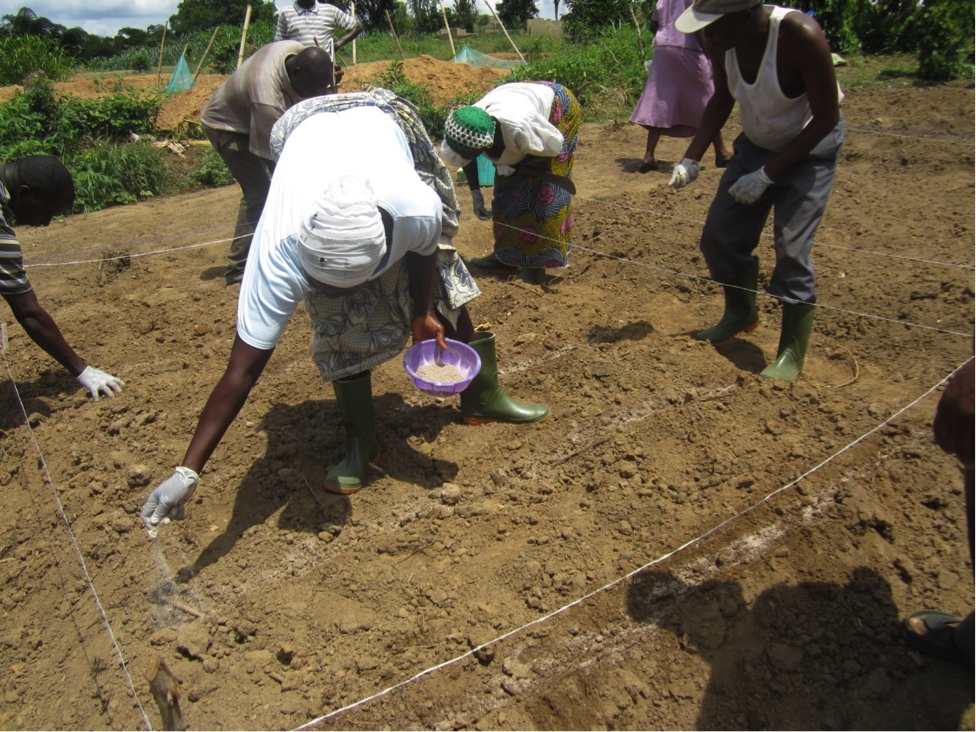
Farmers create a plot at Akaran, Ibadan (in Oyo State) to compare different methods of planting indigenous vegetables.
Empowering women: Growing healthier food in Nigeria
WHAT: The Nigerian Indigenous Vegetable Project is a partnership between the University of Manitoba, Cape Breton University and two universities in Nigeria—Osun State and Obafemi Awolowo University. This joint project aims to improve the diet and income of people in Southwest Nigeria—particularly women—by developing new ways to farm and market wild vegetables previously overlooked by locals. U of M soil science professor Wole Akinremi is a principal investigator on this initiative, which is carried out in four states: Osun, Oyo, Ondo and Ekiti.
HOW IT WORKS: The team has increased public awareness of the nutritional value of green vegetables using radio programs, newsletters, newspapers and TV. They developed new agronomic management practices for on-farm demonstrations with participating farmers in 22 communities encompassing two Agro-Ecological Zones in southwest Nigeria. They demonstrated new methods of post-harvest processing to the farming communities, and developed new food products to increase the variety for consumers and to improve marketing opportunities.
THE GOAL: “To demonstrate the value of underutilized indigenous vegetables as a new source of food and nutrition and the potential of these unique vegetables to improve farm income though improved post-harvest processing, and marketing,” says Akinremi.
WHY IT MATTERS: A substantial proportion of people in developing countries face a three-prong problem: poor quality nutrition, hunger and disease. These problems are further aggravated by global economic meltdown and unpredictable planting seasons in Nigeria, likely due to climate change. Already, more than 70 per cent of Nigerians live below the poverty line—on less than $1 per day—and are classified as poor, with 35 per cent living in absolute poverty. In the next 10 years, the poverty level will deteriorate if food and economic issues are not addressed.
SUCCESSES: “After three years of this project, we have informed through on-site training, more than 1,200 farmers in 22 communities, and perhaps as many as 4 million radio listeners in southwest Nigeria about the value of using fresh local vegetables in their diets,” says Akinremi. “Community workshops have provided training to both women and men on the concepts of money management, savings, and bookkeeping and as a result, farmer cooperatives have been formed in 22 communities which will ensure a more sustainable production plan as farmers can now access credit more readily for purchasing inputs such as good quality seed, fertilizers, and irrigation equipment.”
A MOMENT THAT MATTERED: “At a recent community cooking workshop and food tasting demonstration at Ogbomosho [in Oyo State], the project team had planned to provide food for 50 participating farmers involved in growing and marketing these [underutilized indigenous vegetables] and to our great surprise and gratification, more than 150 farmers and family members arrived. Word-of-mouth had spread quickly that food was being provided and everyone wanted to see and taste these ‘new’ vegetables,” says Akinremi.
FUNDERS: The Department of Foreign Affairs, Trade and Development (DFATD) and International Development Research Center (IDRC) under the Canadian International Food Security Research Fund (CIFSRF)
LEARN MORE






